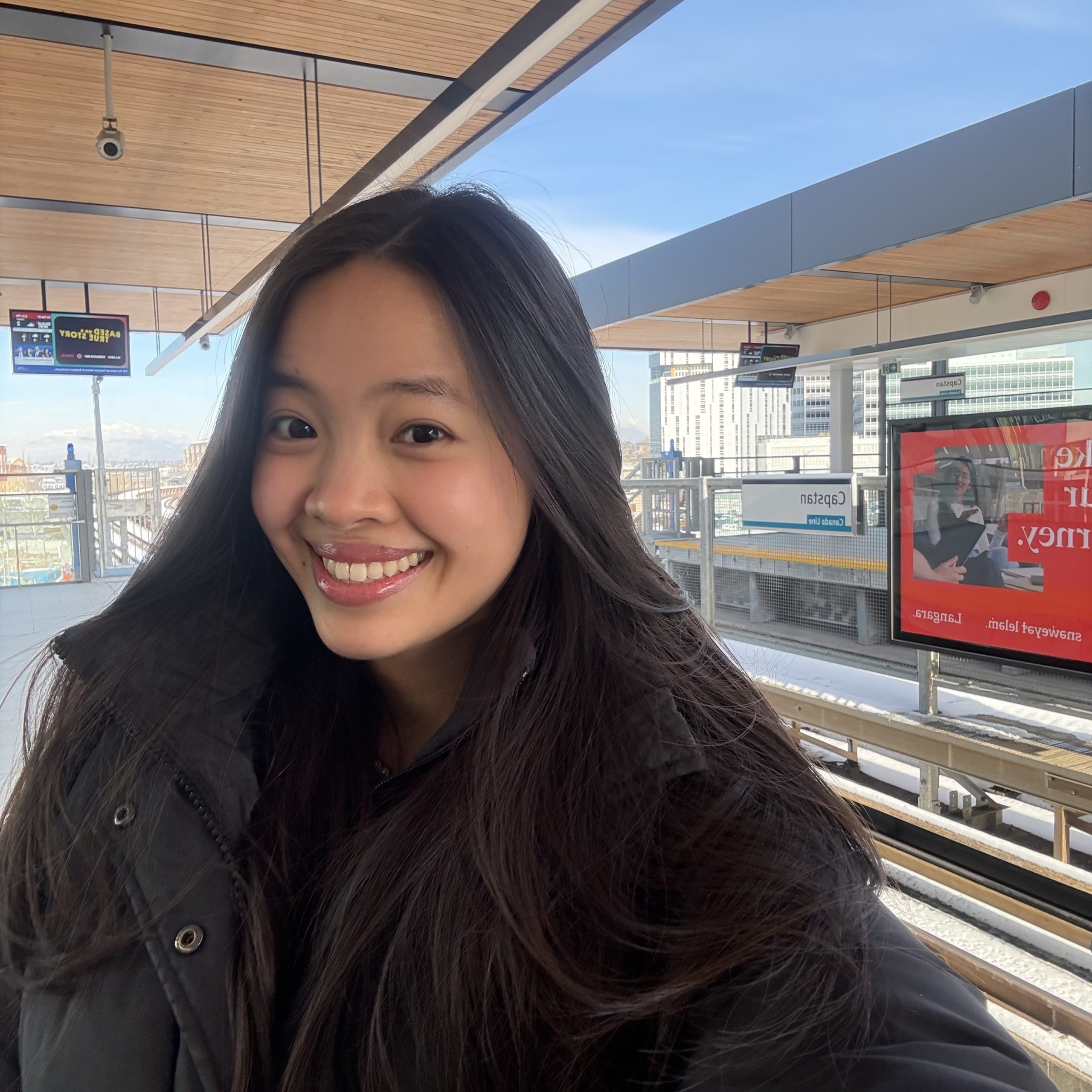Kim Ngo

About
| Pronouns | She / Her |
| Program | Bachelor of Science in Food, Nutrition, and Health |
| Major | Double Major in Food and Nutritional Sciences |
| Hometown | Ho Chi Minh City, Vietnam |
Home Away From Home
Kim is a fifth year student in the Food, Nutrition and Health (FNH) program, pursuing a double major in Food and Nutritional Sciences. Originally from Ho Chi Minh City, Vietnam, she moved to Vancouver in high school and quickly fell in love with the city’s natural beauty, diversity, and sense of community. Drawn to the small and supportive atmosphere of LFS, Kim found the FNH program to be the perfect fit, as it combined her interests in healthcare, food systems, and human biology. Her curiosity about the science behind nutrition, from the chemistry of food processing to the role of diet in managing chronic diseases, led her to pursue both majors to gain a full understanding of the field.
Currently, Kim works as a Work Learn student in LFS Student Services, gaining valuable professional experience. She can’t wait to meet prospective students in her role as the LFS International Outreach Coordinator – find out how to connect with Kim and her outreach team here.
What are three adjectives that describe you?
Accountable, Responsible, Empathetic
Why did you choose UBC? Or why did you choose LFS at UBC?
As an international student, I chose UBC because it is one of the top-ranking universities in Canada and globally recognized for its academic excellence. I first came to Vancouver for high school, and over time, I have made some meaningful connections and fell in love with the city: the weather, the diversity, and the welcoming community. UBC’s beautiful campus, surrounded by nature, with the ocean and mountains, makes it such a special place to study.
I was drawn to LFS because of its small but tight-knit and welcoming community. LFS felt more connected compared to some of the bigger faculties, and I liked the community it provided. I’ve always been interested in healthcare, but wasn’t sure what direction to take until I found out about the Food, Nutrition and Health (FNH) program in LFS. It really stood out to me because it focuses on different aspects of how food industries, food markets, and nutrition affect the human body, which is something I wanted to learn more about in depth. Also, I was interested in potentially pursuing medical school and discovered that LFS offered a pathway towards that.
How did you first become interested in food and nutritional science?
My interest in this field started from personal experiences. I used to have a love-hate relationship with food and struggled with it. That made me curious about how food works: how it’s processed, the science behind it, and how it affects our bodies. I wanted to understand things like how sugar is absorbed, whether intermittent fasting actually works for weight loss, or how a ketogenic diet might help people with diabetes. That curiosity led me to explore both Food Science and Nutritional Sciences. Food Science lets me dive into the chemistry and processing side of food, while Nutritional Sciences focuses more on the impact on human health. Pursuing a double major helped me see the full picture, from both the food industry and the healthcare/dietetic side.
What has been your favourite course and why?
For Food Science, one of my favorite courses has been FNH 425, the capstone project course. I enjoyed it because we got to collaborate with an industry partner on a real-world project, whether it was product development, food innovation, or food analysis. It provided me with hands-on land experience while also helping me strengthen my project management and teamwork skills.
On the Nutritional Science side, I really enjoyed FNH 477. It covered a wide range of common diseases like osteoporosis, diabetes, heart disease, hypertension, and maternal and fetal health. What stood out to me was how the course explained the science behind the role of nutrition in preventing or managing these conditions. It deepened my understanding of how specific nutrients and food groups are linked to chronic disease risk.
What challenges have you faced during your time at UBC? How did you overcome it, and what resources/people helped you, and what did you learn?
As an international student, I’ve needed support with things like extending my study permit, applying for a co-op work permit, and navigating other immigration-related paperwork. UBC’s International Student Advising team has been incredibly helpful throughout these processes. I remember struggling with the work permit application, since international students are legally under a study permit and typically have a cap to how many hours we can work. That’s when I learned about the co-op work permit option, which allows students to work full-time in approved co-op positions. The International Student Advising team provides great legal guidance and resources, especially their online Canvas modules, which offer clear, step-by-step instructions for applying for the documents you need to study, stay, or work in Canada. I think every international student should know about this service; it truly helps make what can be a stressful and confusing process much more manageable.
Interested in studying in the Faculty of Land and Food Systems? Learn more here!
Tagged with: 2025, Ambassador, Food Nutrition and Health, Undergraduate